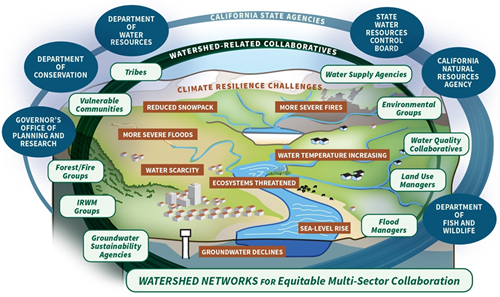Watershed Resilience Program

Graphic showing the many partners involved in watershed networks for equitable multi-sector collaboration and the climate resilience challenges they face.
The California Water Plan Update 2023 emphasizes the need for watershed-based solutions, climate resilience, and equity through collaboration with local partners to address climate extremes.
Key aspects of this approach are:
- Managing water from headwaters to outflow at a watershed scale.
- Prioritizing equity and inclusiveness.
- Analyzing climate risks and adaptations at the watershed level.
- Collaborating across water, flood, groundwater, quality, forest/fire, ecosystem, and land use sectors.
- Developing metrics to track outcomes regionally and statewide.
This approach aligns with the Newsom Administration’s policies, including the California’s Water Supply Strategy (2022) and Water Resilience Portfolio (2020), which focus on climate urgency, regional resilience, and equity.
The Watershed Resilience Program is an evolution of the Integrated Regional Water Management (IRWM) Program that builds on local relationships, trust, and collaborative regional planning while placing a stronger emphasis on climate vulnerability assessment, adaptation planning, watershed-scale collaboration, and equity and inclusiveness. Increased collaboration across water-related sectors- water supply, flood, groundwater, water quality, forest/fire, ecosystem, and land use sectors-is also a priority.
Watershed Resilience Implementation Grant Program
The Watershed Resilience Implementation Grant Program, funded by Proposition 4, will support projects that improve water resilience and adaptation across California. A tentative schedule plans for outreach efforts to begin in late 2025. This program aims to help communities build stronger, more sustainable watersheds to better handle climate challenges.
PLEASE NOTE: More information will be provided as it becomes available. We recommend checking this website frequently for any updates.
Watershed Resilience Pilot Program
The Watershed Resilience Pilot Program supports regional efforts to prepare for climate impacts and improve water sustainability. Funded by the 2021 and 2022 Budget Acts, DWR launched the pilot program in 2024, awarding funds to five diverse regional planning projects. These pilots are creating detailed Watershed Resilience Plans that take a headwaters-to-outlets approach to:
- Center equity in all water decisions
- Assess current water conditions and climate risks
- Analyze threats like drought, floods, wildfire, and water quality
- Develop strategies like groundwater recharge, flood management, and ecosystem restoration
Each project focuses on local challenges. For example, the Regional Water Authority studies reduced snowpack effects on rivers, while Pajaro Valley Water Management Agency addresses sea level rise and saltwater intrusion. Several pilots are also partnering with Tribes for their expertise.
The results will guide future funding and efforts to build stronger, more resilient water systems across California.
2024 Watershed Resilience Pilot Program Funding Recipients:
- Pajaro Valley Water Management Agency
- Regional Water Authority
- Sonoma County Water Agency
- Stockton East Water District
- The Ventura County Resource Conservation

- 2024 Watershed Resilience Program Guidelines were released on January 25, 2024. The document provides general information and establishes the procedures that DWR will use to implement the Watershed Resilience Pilot Program. New Guidelines will be released for Proposition 4 should DWR receive legislative authority to produce Guidelines.
- Awards for the five pilots can be viewed here.
- Watershed Resilience Program - Pilot Overview
- Agreement Template
- California Watershed Resilience Assessment — This technical report presents the approach and findings of a statewide assessment of both climate risk and resilience preparedness at the watershed scale throughout California.
- Watershed Resilience Framework and Toolkit — The Watershed Resilience Framework serves as a roadmap for the State and regions to carry out climate resilience planning. The framework is paired with an online, interactive toolkit that offers planning guidance, best practices, case studies, resources and tools to conduct each step of the framework.
- Watershed Hub Resilience Indicators and Metrics — This technical memorandum describes the approach used to identify and recommend a preliminary set of water-related indicators and metrics to measure, track, and report on changing conditions throughout California’s watersheds.
- Addressing Complex Problems Together: A Network Study — A reflection on forming a network to implement integrated water management using Flood-MAR. This study provides an overview of how forming a network can address complex issues by identifying a shared purpose and bringing together organizations and individuals to work towards a shared outcome.
Contact Us
For questions about the 2024 Guidelines or other issues, please contact DWR’s Financial Assistance Branch at (916) 651-9613 or by e-mail at dwr_irwm@water.ca.gov.
